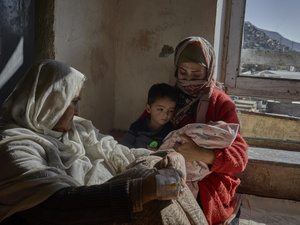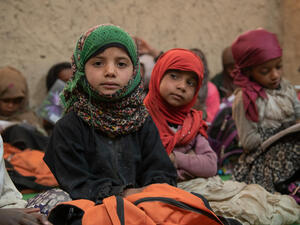Challenges remain in implementation of landmark Colombian law
Challenges remain in implementation of landmark Colombian law

Ten years after Colombia adopted its first law aimed at the country's hundreds of thousands of displaced people, UNHCR is running a year-long campaign to raise awareness about the issue.
ALTOS DE CAZUCÁ, Colombia, July 18 (UNHCR) - Ten years ago, Roberto Camacho arrived in this suburb of Bogota fleeing for his life. A teacher by profession, he had received death threats after advising his students not to join an irregular armed group recruiting young people in his village.
With no place to stay, he built a shack on what was then empty land in the foothills of the mountains outside the Colombian capital. "We moved in on a Saturday night and on the Sunday morning the wind picked up and blew the roof off. I thought I would never last here, not with this cold weather," he recalled.
That same year, on July 18, 1997, the country adopted its first ever law to help victims of forced displacement like Camacho. Soon afterwards, UNHCR began its work in Colombia at the invitation of the government.
"Until then, displaced people were invisible in the eyes of the law. Law 387 was very innovative, it served as the starting point for the elaboration of very comprehensive public policies to protect and assist them," explained UNHCR Representative in Colombia Roberto Meier.
But despite government efforts, full implementation has proved difficult and remains patchy. Just ask Camacho and the tens of thousands of other displaced people he lives alongside and represents as a community leader in Altos de Cazucá on the outskirts of Bogota.
For a long time, the neighbourhood had no electricity and many of the houses are still without running water. Newcomers live in plastic shacks and Camacho said few have received any long-term help to rebuild their lives.
"Year after year, you see families with small children arriving. Sometimes, if they are lucky, they get emergency help for three months. But then nothing, there is no solution to their problem. We have the law on our side and it is a good law, but in practice we get very little," he added.
In 2004, Colombia's Constitutional Court declared the national response to the displacement crisis "an unconstitutional state of affairs" and issued a series of recommendations to remedy the situation. It asked UNHCR to report on the government's compliance.
The government has since increased the budgetary and human resources it dedicates to helping the displaced. Thousands of people have received emergency help in the first months after their displacement, as well as housing and other benefits. But the presidential agency in charge of coordinating the government's response, Acción Social, agrees that more remains to be done.
"We've made great advances, notably with emergency assistance and access to health and education. But we've had very little results with access to the workplace and income generation. There we still have a big gap," said the agency's director, Luis Alfonso Hoyos.
Camacho agreed. At 56, he has not been able to work for 10 years despite his teaching qualifications and experience. He finds discrimination the toughest thing to bear. "Other people look down at us; they say we are with the guerrillas or with the paramilitaries, that we are nothing but trouble. To be a 'displaced' is like a dirty word, an insult. It gets to us after a while, hearing these things," he said, echoing the thoughts of many displaced people.
Ten years after the introduction of Law 387, the Colombian parliament is considering a draft bill to make 2007 the Year of the Rights of Displaced People. The draft proposes the elaboration of new mechanisms of accountability to ensure displaced people can fully enjoy their rights. It also seeks to mobilize national solidarity, an aim UNHCR is supporting with a year-long campaign to raise awareness about the crisis.
"The state's response cannot be complete without the solidarity of each and every Colombian, including the ones lucky enough not to have had to flee and leave everything behind," said Meier.
Forced displacement continues to be a daily reality in Colombia, where an average of 18,000 people are uprooted by violence every month. In total, more than one million Colombians have been registered in the national system for displaced people in the past five years alone.
By Marie-Hélène Verney in Bogota, Colombia









